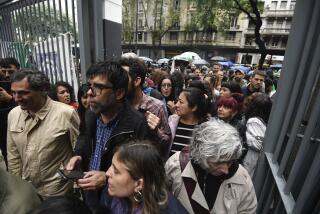Nationwide Strike Hobbles Italy
- Share via
ROME — Millions of Italians staged this country’s first full-day work stoppage in 20 years Tuesday to protest government plans to make it easier to fire workers. Airports were almost deserted, few trains were running, and banks, schools and post offices were closed.
Italy’s three biggest unions estimated that as many as 13 million people had heeded the strike call, out of a total work force of 21 million. They said at least 2 million had taken part in rallies.
Some independent observers said they thought the number of strikers was closer to 6 million.
Workers by the thousands gathered in piazzas up and down the country for mostly festive demonstrations headed by union leaders and center-left politicians and sprinkled with celebrities supporting the strike.
In Rome, Oscar winner Roberto Benigni, of “Life Is Beautiful” fame, brightened up a huge rally in the Piazza del Popolo.
“It’s a grand demonstration,” he said as the crowd roared its approval. “Everything is beautiful.”
The strike did not bring Italy to a standstill, but it slowed it down considerably. Hospitals were providing emergency services only, and many factories were closed. Fiat Group said nearly half its workers took part, while unions claimed the figure was 90%.
About half the usual number of passenger trains were operating, said state railway spokesman Carmine Amodeo.
Many foreign airlines, including British Airways, Iberia and Lufthansa, canceled flights. Alitalia, the national carrier, had scratched more than two-thirds of its flights by midday, a spokeswoman said.
The strike, organized by the top three unions, was labor’s response to conservative Prime Minister Silvio Berlusconi’s vow to reform Italian labor laws, some of the most restrictive in Europe.
Talks with unions that the government had hoped would avert the strike broke down last month. Tensions were aggravated by the March 19 slaying of one of the architects of labor reform, economist Marco Biagi. There were suggestions from Berlusconi’s circle that unions had fostered a charged atmosphere that contributed to the crime. The leftist terrorist group the Red Brigades claimed responsibility for the killing.
The main impasse is over a reform that would eliminate rules requiring employers to take back workers found to have been fired for “unjust causes.” Employers complain that those rules hamper their ability to get rid of unneeded workers. Under the proposed reform, employers would have to pay workers compensation but not take them back.
The government insists that the reforms are necessary to make the Italian economy more competitive and attract foreign investment.
More to Read
Sign up for Essential California
The most important California stories and recommendations in your inbox every morning.
You may occasionally receive promotional content from the Los Angeles Times.













